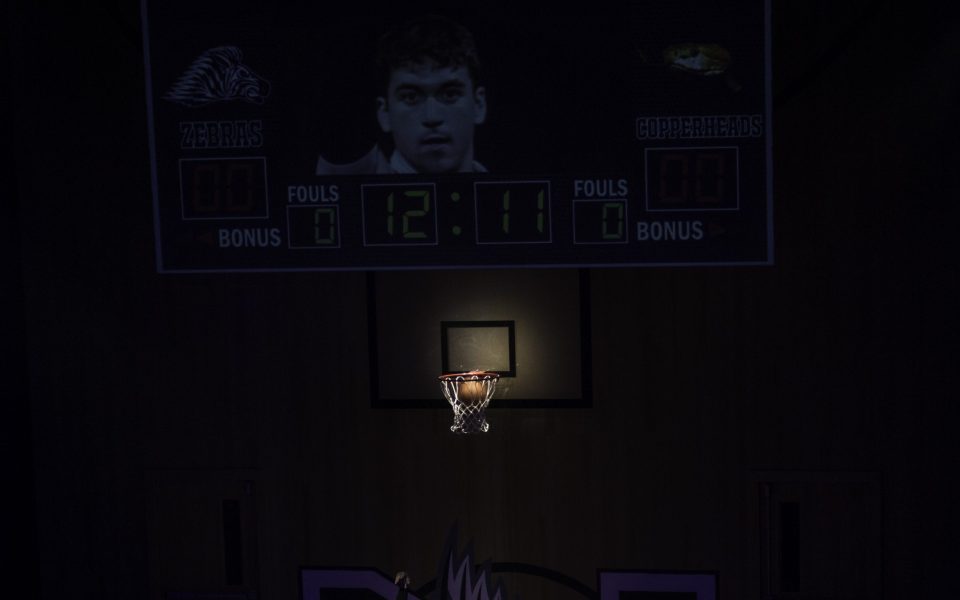by Anthony Harrison
If it wasn’t for theism, college basketball would reign as religion in North Carolina. People around the nation — if not the world — know about the Carolina-Duke rivalry. Commercials immortalize Jim Valvano’s mad search for an embrace following NC State’s Cinderella win at the 1983 national championship. Even schools as small as Davidson College produce talent like Stephen Curry.
But now, UNC-Chapel Hill finds itself embroiled in the fallout of an enormous scholar-athlete scandal, one perpetuated largely by collusion between advisors and the basketball and football players they were supposed to lead on their academic journey.
What a perfect time — especially with the NBA Finals at full, dramatic tilt — for Triad Stage to premiere Preston Lane’s original basketball drama, Common Enemy, at the Pyrle Theatre in downtown Greensboro.
Lane blends William Faulkner and Henrik Ibsen in the play. From Faulkner, Lane creates a fictional town reminiscent of Oxford, Miss.: Hawboro, NC, and Hawboro’s up-and-coming school, Zebulon College. Lane then modernizes the devolving plot of Ibsen’s An Enemy of the People, focused around town baths, through the analogue of basketball.
But unlike Ibsen’s work, Common Enemy completely absorbs the audience into the action of the play. The Pyrle Theatre transforms itself into a half court, including the basket, key and three-point line, with jumbotrons to boot.
The play opens with Ricky Oliver (Adam Barrie), Zebulon’s simpleton star point guard, giving an impassioned monologue, the beginning of a fantastic performance.
“Everyone’s got a ritual, and I got mine,” Ricky says. “Don’t ever change. I go for a run ev’ry mornin’. Don’t push it. Just wake up my body so it’s alive.”
As the first character introduced, Ricky inspires sympathy. And you feel even more sympathy when you realize he leads the Zebulon Zebras to the conference championship, and thus, an unprecedented berth in the NCAA Tournament.
Then, Dr. Bonnie Abernathy (Elizabeth Flax) gives a rowdy pep talk about how much Zebulon’s athletic program achieved.
You’re pumped up. You’re excited. You want Zebulon to go to the big dance. You practically want to yell, “Hell yeah!” for this non-existent team.
But reality sets in.
Patrick Lee (Kurt Uy), a well-meaning educator at Zebulon, uncovers a world of conspiracy concerning the school’s recent athletic growth, mainly revolving around cheating on tests and essays given even before a scholar-athlete’s entrance into the college.
People who loved and admired Lee and his efforts eventually turn against him once Zebulon’s reputation comes into severe question.
And therein is the rub: Who could blame them?
Common Enemy doesn’t just look at basketball. It focuses on Ricky Oliver and his community. Oliver — practically illiterate — has no other opportunity outside of basketball; in a wider sense, neither does Zebulon College or Hawboro. They do what they must to survive.
But at what cost?
When confronted, Lee constantly rails about ideals of integrity and truth and what’s right for his students, the community and even the entire academic world.
And no one cares.
All that matters for Zebulon College is basketball — and, following the 1994 North American Free Trade Agreement which led to the off-shoring of many manufacturing jobs, Zebulon College is everything for Hawboro, the same as it affected real towns in the state.
Dr. Abernathy grills Lee’s teaching assistant, Amira (Mari Vial-Golden), threatening her to the point of turning her back on her educator. Lee’s professorial friend Jim Vance (Ben Baker), already a conservative inflamed by Lee’s muckraking, has some of the best lines in the play in defense of basketball, including, “NCAA is nothing more than indentured servitude…. We know this, Patrick, and we don’t care.”
You feel the pull of cognitive dissonance when watching Common Ground. You empathize with Lee’s fight for the truth and for integrity, but you also understand the struggle of an overlooked community and the hardships of a town in decline.
The brilliant thing about Lane’s script is that everything is ambiguous, since nearly every viewpoint presents itself so starkly. There’s academia. There’s business. There’s entitlement. There’s poverty. There’s potential. There’s pragmatism.
However, personal integrity reigns supreme.
Or does it?
Lee’s peers and others keep saying, “You ain’t from around here, are you?”
Despite the interrogative framing, it’s not something asked — it’s something told.
Lee, seeking truth and justice in the face of corruption, stands martyred as an atheist against basketball, a lesser version of the way Jews were massacred by Catholics in the Spanish Inquisition — if you don’t believe in us fully, we will smite you.
As an early whistleblower, Esther Steeds (Cassandra Lowe Williams), states in the play’s epilogue, “This was never about basketball.”
Common Enemy is and isn’t about basketball. It’s about pride. It’s about integrity. It’s about tradition. But it’s also about the evils of xenophobia, racism and resistance to change.
Basketball broke some barriers in North Carolina. But Common Enemy proves even the most revered structures possess insidious motives.
Common Enemy runs at Triad Stage’s Pyrle Theatre in Greensboro until June 28. Visit triadstage.org for showtimes and ticket sales.
Join the First Amendment Society, a membership that goes directly to funding TCB‘s newsroom.
We believe that reporting can save the world.
The TCB First Amendment Society recognizes the vital role of a free, unfettered press with a bundling of local experiences designed to build community, and unique engagements with our newsroom that will help you understand, and shape, local journalism’s critical role in uplifting the people in our cities.
All revenue goes directly into the newsroom as reporters’ salaries and freelance commissions.


Leave a Reply